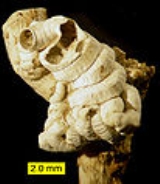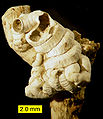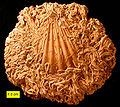
Serpulidae
Encyclopedia

Family (biology)
In biological classification, family is* a taxonomic rank. Other well-known ranks are life, domain, kingdom, phylum, class, order, genus, and species, with family fitting between order and genus. As for the other well-known ranks, there is the option of an immediately lower rank, indicated by the...
of sessile
Sessility (limnology)
In limnology, sessility is that quality of an organism which rests unsupported directly on a base, either attached or unattached to a substrate. It is a characteristic of vegetation which is anchored to the benthic environment. There are two families of sessile rotifers: Flosculariidae and...
, tube-building annelid
Annelid
The annelids , formally called Annelida , are a large phylum of segmented worms, with over 17,000 modern species including ragworms, earthworms and leeches...
worms in the class Polychaeta. The members of this family differ from the sabellid
Sabellidae
Sabellidae are sedentary marine polychaete tube worms where the head is mostly concealed by feathery branchiae. They build tubes out of parchment, sand, and bits of shell...
tube worms in that they have a specialized operculum that blocks the entrance of their tubes when they withdraw into the tubes. In addition, serpulids secrete tubes of calcium carbonate
Calcium carbonate
Calcium carbonate is a chemical compound with the formula CaCO3. It is a common substance found in rocks in all parts of the world, and is the main component of shells of marine organisms, snails, coal balls, pearls, and eggshells. Calcium carbonate is the active ingredient in agricultural lime,...
. There are about 300 known species in the Serpulidae family, all but one of which live in saline waters. The group is known from the Middle Triassic (Vinn and Mutvei 2009).
The blood of most species of serpulid and sabellid worms contains the oxygen-binding pigment chlorocruorin
Chlorocruorin
Chlorocruorin is an oxygen-binding hemeprotein present in the blood plasma of many annelids, particularly certain marine polychaetes. Its affinity for oxygen is weaker than that of most hemoglobins...
. This is used to transport oxygen to the tissues. It has an affinity for carbon monoxide
Carbon monoxide
Carbon monoxide , also called carbonous oxide, is a colorless, odorless, and tasteless gas that is slightly lighter than air. It is highly toxic to humans and animals in higher quantities, although it is also produced in normal animal metabolism in low quantities, and is thought to have some normal...
which is 570 times as strong as that of the haemoglobin found in human blood.
Empty serpulid shells can sometimes be confused with the shells of a family of marine
Marine (ocean)
Marine is an umbrella term. As an adjective it is usually applicable to things relating to the sea or ocean, such as marine biology, marine ecology and marine geology...
gastropod mollusks, the Vermetidae
Vermetidae
Vermetidae, common name the worm snails or worm shells, is a taxonomic family of small to medium-sized sea snails, marine gastropod molluscs in the clade Littorinimorpha....
. The most obvious difference is that serpulid shells are dull inside, whereas the molluscan vermetid shells are shiny inside.
Selected genera

- Amplaria Knight-Jones, 1973
- Anomalorbis Vine, 1972
- Apomatus Philippi, 1844
- Bushiella Knight-Jones, 1973
- Capeospira Pillai, 1970
- Chitinopoma Levinsen, 1884
- Circeis Saint-Joseph, 1894
- Crucigera Benedict, 1887
- Dexiospira Caullery and Mesnil, 1897
- Dextralia Knight-Jones, 1973
- Ditrupa Berkeley, 1835
- Eulaeospira Pillai, 1970
- Ficopomatus Sauthern, 1921
- Filograna Oken, 1815
- Filogranella Ben-Eliahu and Dafni, 1979
- Filogranula Langerhans, 1884
- GaleolariaGaleolariaGaleolaria is a genus of tube-building annelid fanworms in the family Serpulidae. -Form:Galeolaria, is first observed by the limy tubes within which the worm lives...
Lamarck, J.B. de (1818) - Hyalopotamus Marenzeller, 1878
- HydroidesHydroidesHydroides is a genus of tube-forming serpulid worm found on submerged saltwater rocks, shells, and boats in many coastal areas around the world.- Species :It contains the following species:* Hydroides bispinosa...
Gunnerus, 1768 - JanuaJanuaJanua is a genus of polychaetes, containing the following subgenera and species:Dexiospira Caullery & Mesnil, 1897*Janua ainu Uchida, 1971*Janua bushi *Janua ceylonica *Janua corrugata...
Saint-Joseph, 1894 - Josephella Caullery and Mesnil, 1896
- Leodora Saint-Joseph, 1894
- Metavermilia Bush, 1904
- Neodexiospira Pillai, 1970
- Neovermila Day, 1961
- Nidificaria
- Paradexiospira Caullery and Mesnil, 1897
- Paralaeospira Caullery and Mesnil, 1897
- Pileolaria Claparede, 1870
- Placostegus Philippi, 1844
- Pomatoceros Philippi, 1844
- Pomatoleios Pixell, 1912
- Pomatostegus Schmarda, 1861
- Protolaeospira Pixell, 1912
- Protula Risso, 1826
- Pseudochitinopoma Zibrowius, 1969
- Pseudovermilia Bush, 1907
- Salmacina Claparede, 1870
- Semivermila Imajima, 1978
- SerpulaSerpulaSerpula is a genus of sessile, marine annelid tube worms that belongs to the Serpulidae family...
Linnaeus, 1767 Type genus. - Simplicaria Knight-Jones, 1973
- SpirobranchusSpirobranchusSpirobranchus is a small genus of tube-building annelid fanworms in the family Serpulidae.-Species:There are currently two known species in the genus.* Spirobranchus giganteus Pallas, 1766. Christmas-tree worm....
Blainville, 1818 The Christmas-tree worms. - SpirorbisSpirorbisSpirorbis is a genus of very small polychaete worms, usually with a white coiled shell. Members of the genus live in the lower littoral and sublittoral zones of rocky shores. Spirorbis worms usually live attached to seaweeds, but some species live directly on rocks, shells or other hard substrates...
Daudin, 1800 - Vermiliopsis Saint-Joseph, 1894
- Vinearia

